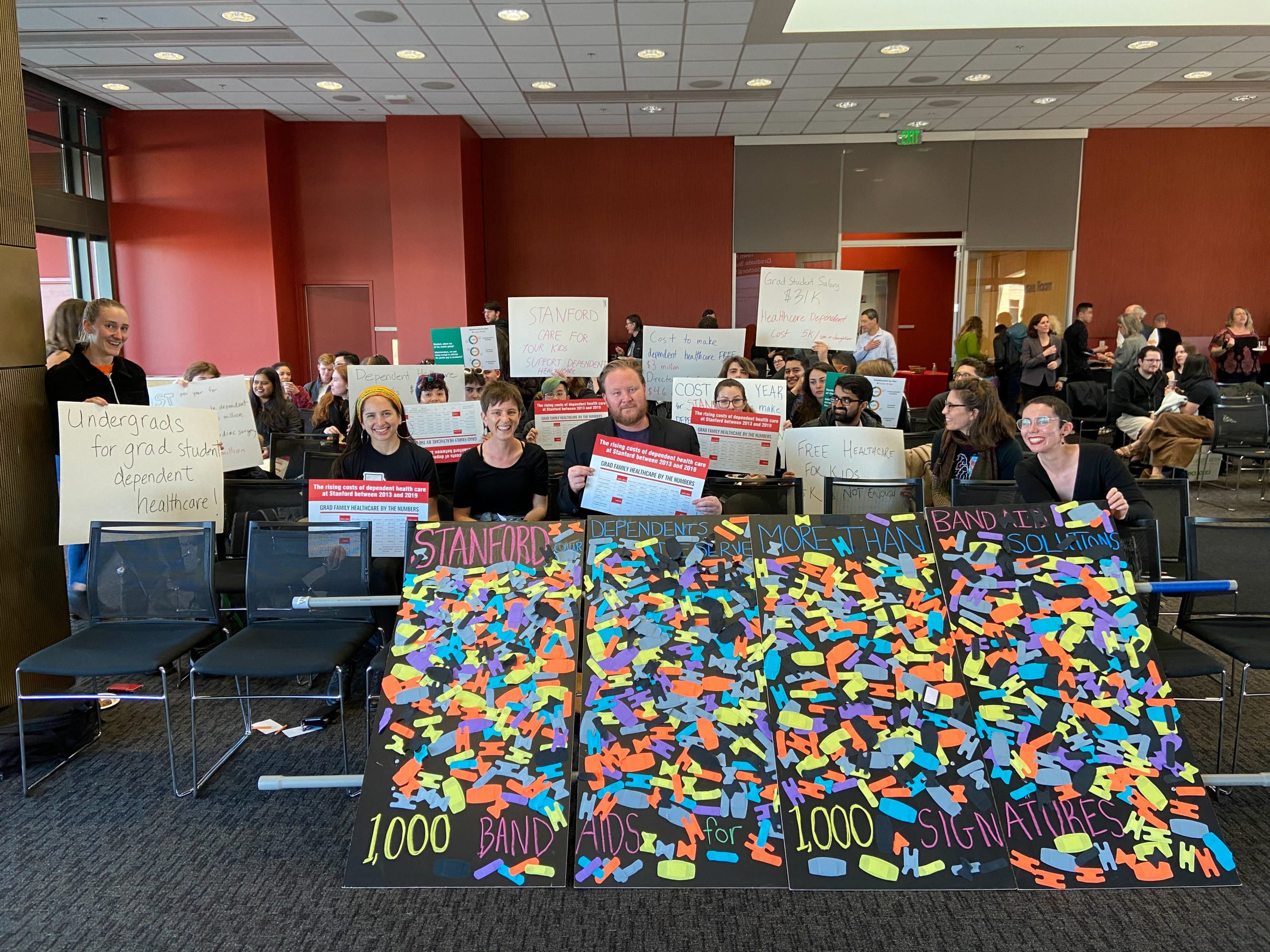Graduate students protested the rising costs of the University dependent healthcare plan in a demonstration coordinated by the Stanford Solidarity Network (SSN) at a Thursday town hall held by Vice Provost for Graduate Education and Postdoctoral Affairs Stacey Bent. The town hall was advertised as an opportunity for students to discuss the “community’s educational needs” with Bent.
The cost of Stanford’s dependent healthcare plan has increased by around 80% since the 2013-14 school year, meaning that students with a spouse and children have seen premiums increase from $496.08 to $893.69 per month. In the past year, the plan’s cost has increased by 12.2% to 15%, varying with the number of dependents a student has, translating into an increased fee of over $100 a month.
“We are here because we want to raise awareness of this issue,” said SSN media representative and first-year East Asian Languages and Cultures graduate student Katherine Whatley. “The administration is not taking this seriously, and we think that they should.”
Bent said she looked forward to continuing to work with graduate students on healthcare affordability in a statement to The Daily after the event.
“I appreciate graduate students and postdoctoral scholars who attended today’s town hall advocating for the issues they care about,” Bent wrote. “I look forward to learning more and working together to address the issues of most importance to the graduate student and postdoctoral scholar communities.”
Protestors clash with Bent
The protestors asked Bent pointed questions during the town hall.
After Alexa Russo, second-year anthropology Ph.D. student, asked, “Why won’t Stanford make dependent healthcare free?” attendees broke into applause and several students stood up holding signs in support of making dependent healthcare more affordable.
Whatley followed this, asking, “Are we a business? Or are we really an institution that promotes knowledge and who cares about the people in this community?”
Bent thanked the two for their advocacy, while members of the audience shouted, “We want free.”
Bent said the University was taking a two-pronged approach to make healthcare more affordable: providing more need-based financial aid and reducing healthcare costs.
“This is an expensive issue,” Bent said.
Bent cited the Family Grant that the University introduced last year as a measure that could improve healthcare affordability. In the 2018-19 school year, the grant provided families with up to $10,000 a year for healthcare and childcare expenses. The grant was renewed for the 2019-20 school year, increasing the maximum amount families could apply for to $15,000.
Michael Mara, a sixth-year computer science graduate student, said the grant was an insufficient response to affordability concerns.
“The Family Grant program is insufficient for many families and, worse, creates devastating gaps in coverage where families in need do not know about the program or are rejected or feel too much stigma to apply,” Mara said.
Fifth-year history Ph.D. student Justine Modica criticized the premise that making dependent healthcare free would be a large sum for University, citing the salaries of highly paid Stanford employees like football coach David Shaw, who earned $5.6 million in the 2015 fiscal year, nearly twice the $3 million requested by the protestors to cover dependent healthcare fees.
“I think when the University says this isn’t affordable, we have to ask, ‘What does it consider affordable?’” Modica said.
Bent shifts meeting focus
After the first round of questions, Bent shifted the focus of the town hall to addressing broader affordability concerns. Bent frequently referred to the Affordability Task Force, a University group created to address issues of affordability as a part of Stanford’s long-range planning.
When pressed by audience members about the University’s plans, Bent said, “I don’t have anything specific to give you other than that there are routes for follow-up. As always, I’m happy to meet with you to talk in more detail.”
“I really do appreciate the advocacy,” Bent said. “I want to remind you that we have staff, not just in my office. I’m just one person among many who really are resources, and we really care deeply about students and postdocs here.”
Some attendees left the town hall unsatisfied.
“It was upsetting to hear all of these awful stories and have the same lack of reaction from Stacey,” said Sanna Ali, a third-year communications Ph.D. student. “It’s really disappointing, but it’s also inspiring that all these people are here, even if they don’t have families, because they’re upset about the issues.”
Contact Danielle Echeverria at dech23 ‘at’ stanford.edu.
